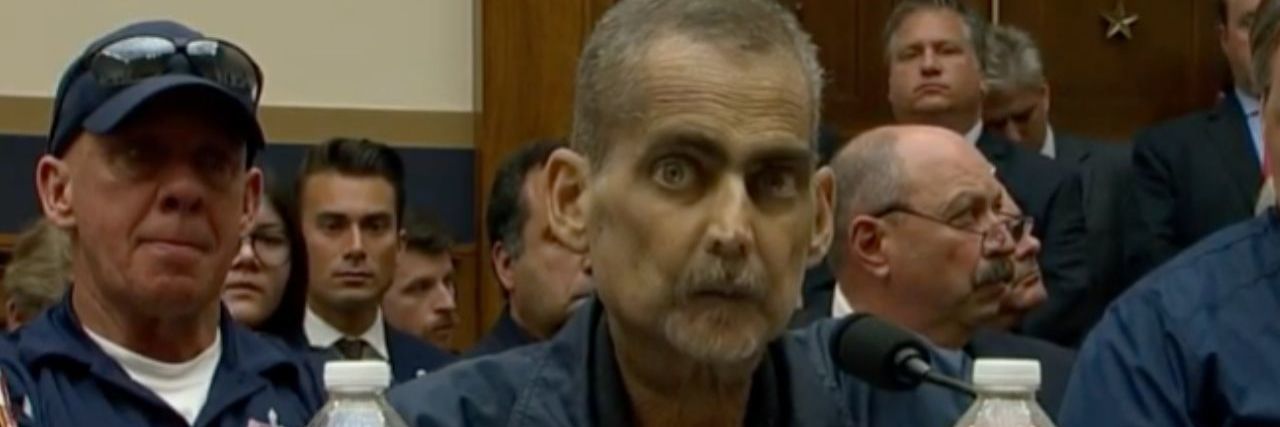9/11 Responder Enters Hospice Care After Powerful Testimony With Jon Stewart
Update: On Saturday, June 29, Luis Alvarez, a former U.S. Marine, NYPD bomb-squad detective and first responder during the 9/11 terrorist attacks in 2001, died at age 53 from colorectal cancer, according to a Facebook post from his family. Alvarez gave powerful testimony in Washington, D.C. earlier in June, advocating for other 9/11 first responders alongside Jon Stewart. Days after his testimony he entered hospice care. “It is with peace and comfort, that the Alvarez family announce that Luis (Lou) Alvarez, our warrior, has gone home to our Good Lord in heaven today,” the family wrote. “Please remember his words, ‘Please take care of yourselves and each other.’ We told him at the end that he had won this battle by the many lives he had touched by sharing his three year battle. He was at peace with that, surrounded by family.”
One of the 9/11 first responders who advocated alongside Jon Stewart for healthcare compensation for victims of the September 11 terrorist attacks revealed he is currently in hospice care.
Luis Alvarez, a former NYPD bomb squad detective who worked at Ground Zero and now has colorectal cancer, testified with Stewart on Capitol Hill in Washington, D.C., last week to advocate for the renewal of the September 11 Victim Compensation Fund (VCF). The fund opened in 2011 and provides payouts to people dealing with health issues due to exposure to toxins at the site of the attacks. The fund was set to expire in 2020 and has already been cutting the amount of its payouts as it runs out of money, despite thousands of claimants still awaiting payment.
Alvarez posted a Facebook status Wednesday explaining he was scheduled to receive chemotherapy (his 69th session) the day after he testified in Washington, D.C., but his doctors discovered his liver had completely shut down because of his tumors. His body was filling with ammonia because his liver couldn’t clean out the toxins. He said he’s now in hospice because there is nothing else doctors can do to fight the cancer.
“I will continue to fight until the Good Lord decides it’s time. I will try to do a few more interviews to keep a light on our fight for the VCF benefits we all justly deserve,” Alvarez wrote.
Hello everyone, “I’m still here and still fighting.” I just wanted to let you know, what is going on with me. Since you…
Posted by Lou Alvarez on Tuesday, June 18, 2019
Stewart and Alvarez’s testimony last week represented the latest battle in a decade-long fight for acknowledgment of the impact working among the debris at Ground Zero had on first-responders’ health and for compensation for their medical bills. Immediately following the attacks, the head of the Environmental Protection Agency (EPA) and former New York Mayor Rudy Giuliani claimed the air was safe to breathe and water was safe to drink.
However, in the years that followed, first responders began getting sick — in 2007, the rate of illness among first responders (who were allowed to work without using proper respiratory protection) as a result of 9/11 contamination was 70%. Illnesses ranged from the so-called “9/11 cough” to mental health issues, respiratory and gastrointestinal conditions, and cancer. As evidence grew that toxins emanating from “the pile” at Ground Zero were hazardous to health, victims filed lawsuits against New York City and others, claiming the government had been negligent in its response to the disaster.
The Zadroga 9/11 Health and Compensation Act to provide treatment and medical benefits for first responders and survivors was signed into law in 2011, despite a Republican effort to block the bill for being too expensive. At the hearing last week for the VCF renewal, Stewart, Alvarez and others delivered impassioned remarks to the House Judiciary Subcommittee on the Constitution, Civil Rights and Civil Liberties. Though there are 14 members on the committee, fewer than half showed up to the hearing.
“What an incredible metaphor this room is for the entire process that getting health care and benefits for 9/11 first responders has come to,” Stewart said. “Behind me, a filled room of 9/11 first responders, and in front of me, a nearly empty Congress. Sick and dying, they brought themselves down here to speak, to no one. Shameful. It is an embarrassment to the country and it is a stain on this institution.”
“You made me come down here the day before my 69th round of chemo and I’m going to make sure that you never forget to take care of the 9/11 responders,” Alvarez said.
Fighting for healthcare benefits should never be something people with chronic illnesses and disabilities have to worry about, but Alvarez’s experience is all too common. People facing chronic health challenges often have to spend hours advocating for coverage of things like medication, surgery and mobility aids, while insurance providers require “proof” they are “sick enough” to need them. Mighty contributor Sarah Marks, who has spina bifida, offered these words of support to anyone who has to fight to get the care they need:
Battling with medical insurance can make you question not just what your needs are, but your overall worth. It’s so easy to internalize the idea that your needs are simply an inconvenience when you constantly have to struggle to have them met. If you are struggling with insurance to get the care you need, I want you to know you are not alone. You are worth it. Be persistent and insist on what you need, not just to exist, but to thrive.

